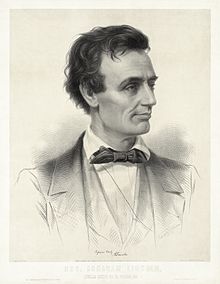Abraham Lincoln in the Black Hawk War
| Abraham Lincoln | |
|---|---|

Abraham Lincoln in 1860
|
|
| Nickname(s) | Honest Abe |
| Born | February 12, 1809 Hardin County, Kentucky |
| Died | April 15, 1865 Washington, D.C. |
| Allegiance | United States |
| Service/branch | Illinois Militia |
| Years of service | April 21, 1832 – July 10, 1832 |
| Rank | |
| Commands held | Rifle company of the 31st Regiment of Militia of Sangamon County, 1st Division |
| Battles/wars | no combat experience, aftermath of Battle of Kellogg's Grove and Battle of Stillman's Run (Black Hawk War) |
| Other work |
Illinois State Representative United States Congressman President of the United States |
Abraham Lincoln served as a volunteer in the Illinois Militia from April 21, 1832 – July 10, 1832 during the Black Hawk War. Lincoln never saw combat during his tour but was elected captain of his first company. He was also present in the aftermath of two of the war's battles, where he helped to bury the militia dead. He was mustered in and out of service during the war, going from captain to private and finishing his service in an independent spy company commanded by Captain Jacob Early.
Lincoln's service had a lasting impression on him and he related tales about it later in life with modesty and a bit of humor. Through his service he was able to forge lasting political connections. In addition, he received a land grant from the U.S. government for his military service during the war. Though Lincoln had no military experience when he assumed command of his company, he is generally characterized as an able and competent leader.
Angered by the loss of his birthplace via prior disputed treaties, and against the best interests of other tribes affected, Black Hawk led a number of incursions across the Mississippi River beginning in 1830. Each time, he was persuaded to return west without bloodshed. In April 1832, encouraged by promises of alliances with other tribes and the British, he again moved his "British Band" into Illinois.
On April 5, 1832, Black Hawk and around 1,000 warriors and civilians recrossed the Mississippi River into Illinois in an attempt to reclaim their land. About half of Black Hawk's band were combatants and the rest were a combination of women, children, and elderly. The band consisted of Sauk, Fox, some Potawatomi, and some Kickapoo; in addition, some members of the Ho-Chunk nation were sympathetic to Black Hawk.
Black Hawk's reasons for crossing into Illinois were to reclaim lost lands, and perhaps create a confederacy of Native Americans to stand against white settlement. Promises of aid from other Illinois tribes were made to the British Band, and Black Hawk believed that promises of assistance were made by the British in Canada.
...
Wikipedia
